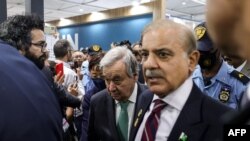UN climate talks were deadlocked Thursday over calls to create a special fund to cover the losses suffered by vulnerable nations hit by natural disasters, raising the risk that negotiations could collapse.
With the two-week COP27 conference officially due to finish on Friday, negotiators in Egypt said the talks would likely go on overnight as they scramble to find a compromise over the contentious issue.
The text does not include details for launching such a fund - a key demand from the most climate vulnerable countries, such as island nations. Rather, it "welcomes" the fact that the topic was taken up as part of this year's official agenda.
"We are out of time and we are out of money and we are out of patience," Ralph Regenvanu, minister of climate change for the Pacific island of Vanuatu, said at a news conference.
"We must establish at this COP27 a loss and damage finance facility."
Regenvanu said walking out of the talks "was discussed as an option" if developing nations come away empty handed.
The inclusion is based on requests that delegates from nearly 200 countries have sought to be included in the final deal. It will provide a basis for negotiations over the coming days that are likely to substantially flesh out and rework the text.
The draft COP27 final communique repeats the goal from last year's Glasgow Climate Pact "to accelerate measures towards the phase down of unabated coal power and phase out and rationalize inefficient fossil fuel subsidies."
At the Glasgow COP26, countries agreed to develop a plan to "urgently scale up" emission-reduction efforts in recognition that the world would need to slash emissions 45% by 2030 to keep warming within 1.5 degrees Celsius (2.7 degrees Fahrenheit), the threshold beyond which scientists say climate change risks spinning out of control.
Temperatures have already increased by 1.1C.
It does not call for a phase down of all fossil fuels, as India and the European Union had requested.
It gives no timeline for deciding on whether a separate fund should be created or what it should look like, giving time for negotiators to continue to work on the contentious topic.
Other unresolved issues include calls for boosting a global goal for finance to help developing countries adapt to the impacts of a warmer world, and plans for ratcheting up targets for cutting climate-warming emissions.
Climate policy experts said there was deep concern about the talks reaching consensus on many key issues.
"I think it's going be quite a long and difficult journey to the end of this process. I'm not sure yet where these talks will land," said European Commission Vice President Frans Timmermans.
"If this COP fails we all lose and we have absolutely no time to lose," he told journalists.
"I think the problem is that there’s a lot in here, and lots of it will be shot down by parties on all sides", said Tom Evans, a climate policy analyst at the E3G nonprofit think-tank.
